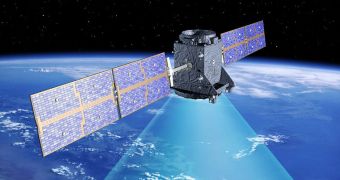Officials at the European Space Agency (ESA) announce the organization's decision to end the mission of the GIOVE-A satellites, a pioneering navigation spacecraft that paved the way for the advent of the Galileo positioning system.
The GIOVE-A spacecraft, one of the most important prototype satellites ESA has ever constructed, was launched on December 28, 2005, as a lead validation element for Galileo. Even after more than six years in orbit, the spacecraft is still in good shape, and can boast having achieved its mission flawlessly.
Now that the first two Galileo satellites have been launched to orbit from the Kourou Spaceport, in French Guiana, South America, the services of the first Galileo In-Orbit Validation Element satellite (GIOVE-A) are no longer required, experts say.
Its first companion, called GIOVE-B, launched on April 27, 2008, carrying an ultra-precise passive hydrogen maser atomic clock. The goal was to determine whether the maser was more precise than the prototype rubidium atomic clock that GIOAVE-A was carrying.
In addition to conducting validating experiments, the spacecraft was also very important for securing the radio frequencies that the International Telecommunications Union (ITU) had set aside for use by the European satellites.
While ESA officially ended the mission at the end of last month, the spacecraft will not be retired from active duty. Daily operational support will continue to be provided by Guildford, UK-based prime contractor Surrey Satellite Technology Ltc.
The company plans to gather radiation data, in order to determine the heading and intensity of solar radiation blasts ahead of time. This can help them protect satellites from the severe devastation that such energetic events can bring.
“GIOVE-A had a design life of only 27 months, so to continue operating for 78 months is impressive. In August 2009, the satellite was moved into a graveyard orbit around 100 km above its normal 23,222 km to make way for the Galileo validation satellites,” says Valter Alpe.
The expert is in charge of managing all GIOVE activities for ESA. “The first two [Galileo satellites] were launched on 21 October 2011 and are performing well, so while GIOVE-A has served ESA well it no longer has a job to do,” he concludes.

 14 DAY TRIAL //
14 DAY TRIAL //